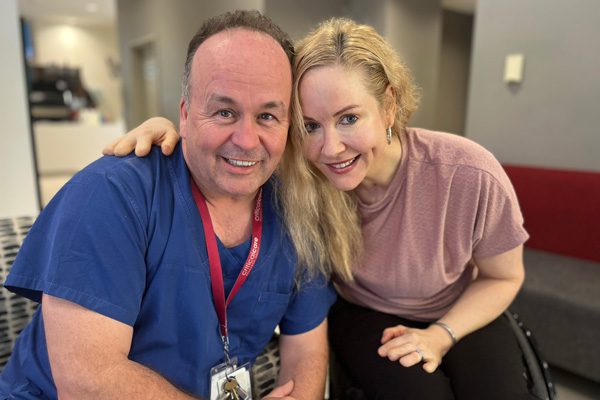Australian honours help reunite doctor and patient after 20 years

Professor John Fraser and Lisa Cox
The unexpected reunion of a world-renowned doctor and former patient after more than 20 years is helping drive an exciting new focus in sepsis research at The Prince Charles Hospital.
Lisa Cox OAM was 24 years old with an emerging career in advertising when she suffered a catastrophic stroke at Melbourne Airport. Her organs shut down, she was in a coma for weeks and amnesia has taken much of her memory from that time.
She was medically airlifted from Melbourne and soon under the care of renowned specialist Professor John Fraser and the ICU team at The Prince Charles Hospital, where she stayed for 12 months.
However, one of her biggest battles was contracting sepsis, a life-threatening inflammatory response to an infection that can lead to a person’s body damaging its own tissues and organs. Sepsis can be difficult to diagnose and treat.
Lisa lost her left leg, all remaining toes on her right foot, nine fingertips and had many other complications due to sepsis and had to re-learn basic skills during several years of rehabilitation.
“I taught myself how to type again on mum and dad’s kitchen table and got back in to freelance advertising, writing and media,” Lisa said.
She’s now a professional writer having written two books and several articles published nationally and internationally.
Earlier this year, Lisa was awarded an OAM for service to people with a disability. The same year, Professor John Fraser received an AO for distinguished service to medicine and global research.
Lisa recognised John’s name in the honours list and reached out to her former doctor, who are now great friends and catch-up regularly. In his lilting Scottish brogue, Professor Fraser speaks happily about being reunited with Lisa.
“It’s great that Lisa got back in touch. When we see people who are really sick, we frequently don’t hear what happens next,” Prof Fraser said.
“Many times we thought she wasn’t going to make it, so it’s wonderful for our team to see how their hard work has assisted in her recovery and how successful she’s been.
“Lisa being awarded the OAM is phenomenal – to be an advocate for people, for patients, it can be just as important in the equation as doctors and scientists.”
Prof Fraser said a key area of focus for the Clinical Care Research Group (CCRG) based at TPCH was on improving survival rates for patients who contract sepsis.
“With researcher Dr Nchafatso Obonyo we’re looking at how we minimise sepsis causing problems to the kidneys, to the limbs and everywhere else,” Prof Fraser said.
“Lisa has lived experience and can explain how bad sepsis can be, and how it can present in a million different ways.
“We can do the science, but we need to get the story out there, too. And Lisa is the embodiment of the importance of great treatment informed by great research.
“If Lisa was in hospital with the same diagnosis 10 years before, she would have died.
“We need to come together – patients with lived experience, clinicians, researchers – that’s what success is.
“Each day do a little bit better, then a little bit better, so one day people who get sepsis won’t lose their fingers, won’t lose their toes.”
Lisa is happy to contribute her lived experience to grow sepsis research at CCRG.
“What John and his team does changes lives like mine – they are brilliant,” Lisa said.
“We can complement each other and learn together.”
World Sepsis Day is held every year on September 13 for people across the world to unite in addressing the impact of sepsis.
It is known as the ‘silent killer’ as its symptoms often mimic that of other, less serious illnesses such as a cold or gastroenteritis. It’s considered a medical emergency, like a heart attack.
Raising awareness of the signs and symptoms is key to ensuring people recognise it early and seek urgent medical attention. Signs an adult may have sepsis include:
- fast breathing or breathlessness
- fever and chills
- low body temperature
- low or no urine output
- fast heartbeat
- nausea and vomiting
- diarrhoea
- new fatigue, confusion, drowsiness or change in behaviour.
For more information on sepsis visit the Queensland Government website or Sepsis Australia.
